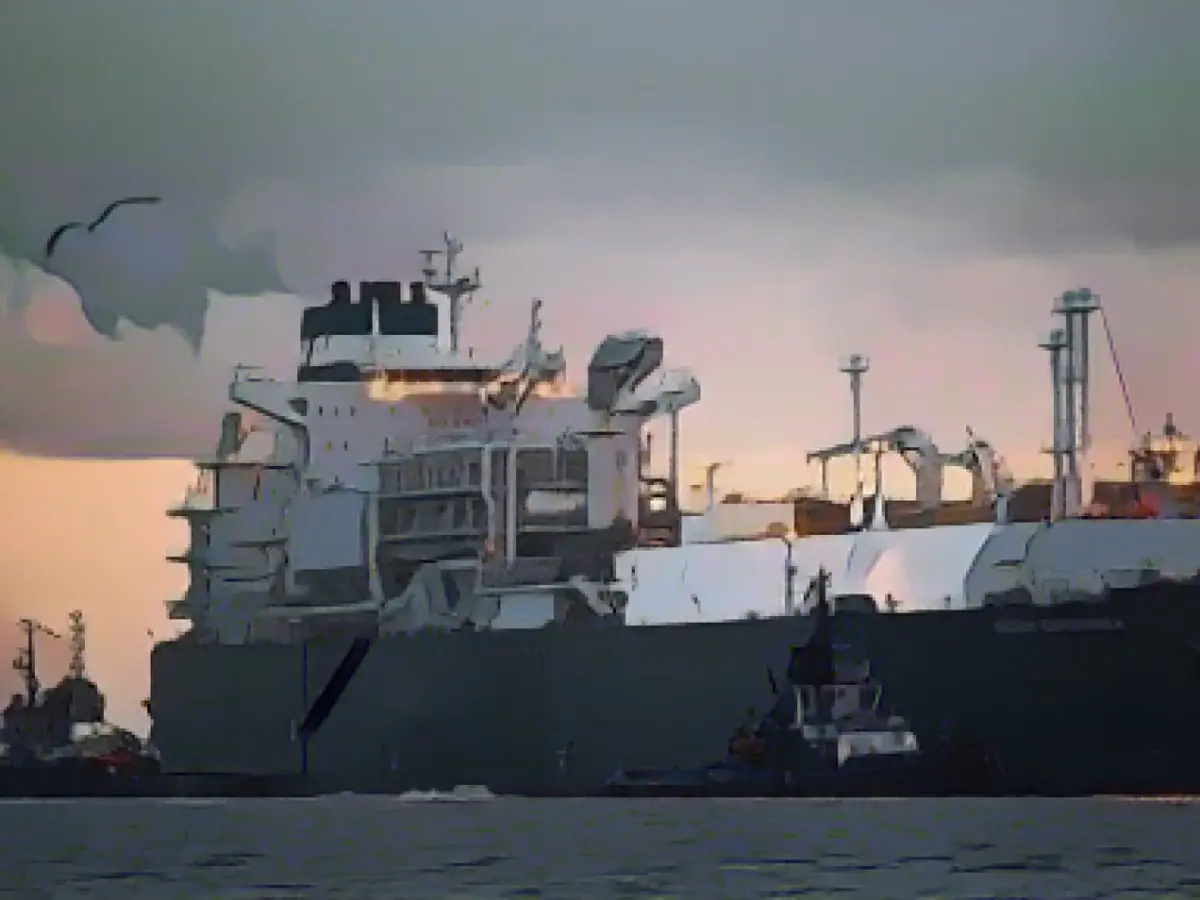Cleaning - LNG terminal continues to use chlorine - but volumes could fall
The floating terminal for the import of liquefied natural gas (LNG) in Wilhelmshaven will not be able to do without the controversial discharge of chlorinated wastewater into the Jade for the time being. This is the result of an as yet unpublished minimization concept presented by the terminal operator Uniper in the summer and first reported on recently by the "Neue Osnabrücker Zeitung". In the concept, which is also available to the Deutsche Presse-Agentur, Uniper describes the examination of more than 20 alternative cleaning processes for the seawater systems of the special ship "Höegh Esperanza". However, the report states that no alternative is better suited to keeping pipes free of mussels or barnacles than chlorination.
Biocide in the form of active chlorine is used to prevent biofouling. This is because in order to convert the liquefied natural gas delivered by tankers on the "Höegh Esperanza" back into gas, it is heated on board using North Sea water, for example. Chlorine is used to prevent the ship's seawater systems from becoming overgrown with algae and mussels. To do this, the sodium chloride contained in the seawater is converted into active chlorine using electrolysis.
Criticism of biocide discharge
Up to 178 million cubic meters of wastewater containing chlorine may be discharged into the Jade each year when the seawater systems are cleaned. Environmental protection associations, local residents and mussel fishermen criticize this. They fear that the continuous discharge of the biocide will damage nature and living creatures - including in the adjacent Wadden Sea.
According to the authorities, water samples taken to protect the environment have mostly remained below the chlorine limit. However, the NLWKN approval authority had stipulated a so-called reduction requirement in the water permit for the terminal and demanded that the use of chlorine "must be kept to a minimum". The operator Uniper also had to submit the minimization concept for this by the summer.
Chlorine quantity could be reduced
In the minimization concept, Uniper is now proposing to switch to so-called shock chlorination - i.e. only using chlorine when the growth pressure of algae and mussels requires it. According to the company, this could save 30 to 50 percent of the amount of chlorine that is otherwise used in the continuous process. Tests are now to follow.
For the time being, Uniper rejects the idea of converting to an ultrasonic process, as demanded by environmentalists and as planned by the consortium around the company Tree Energy Solution (TES) for the second planned LNG terminal ship in Wilhelmshaven. Many questions regarding the application are still unresolved. Instead, the Group proposes in the concept to wait until the ultrasonic process is used on the second terminal ship, which is scheduled to go into operation in 2024.
Ministry of the Environment in favor of rapid conversion
The Ministry of the Environment in Hanover, on the other hand, is pushing for the fastest possible conversion to a chlorine-free cleaning process. "The aim must be to further minimize the use of chlorine in the "Höegh Esperanza"," said Environment Minister Christian Meyer (Greens). If the ultrasound technology proves its worth, it should be retrofitted quickly. The budget committee of the Bundestag had already made funds available for such a conversion.
According to Meyer, the first step should be to halve the amount of biocide as proposed by means of shock chlorination. However, the responsible Lower Saxony State Agency for Water Management, Coastal Defence and Nature Conservation (NLWKN) is still examining the Uniper concept.
In the minimization concept, Uniper proposes a twelve-month trial phase, which could begin at the start of 2024. Uniper did not provide any information on the content of the concept when asked.
The LNG terminal in Wilhelmshaven was the first in Germany to go into operation around a year ago. According to Uniper, the terminal can cover around six percent of Germany's gas requirements.
Uniper information on the LNG terminal in Wilhelmshaven NLWKN on approval procedure for LNG terminal NLWKN on monitoring LNG discharges NOZ article
Read also:
- A clan member is punished here
- Will he be convicted as Jutta's murderer after 37 years?
- He also wanted to kill his cousin
- With live stream! Gawkers film dying man
- Uniper, the operator of the LNG terminal in Wilhelmshaven, has presented a minimization concept to reduce the use of chlorine in its seawater systems, as required by the NLWKN approval authority.
- The concept involves switching to shock chlorination, which could save up to 50% of the chlorine normally used in the continuous process for cleaning the ship's systems.
- However, the Ministry of the Environment in Hanover is pushing for the quickest possible conversion to a chlorine-free cleaning process, citing the potential harm to nature and living creatures.
- The LNG terminal in Wilhelmshaven, which began operating about a year ago, is capable of providing around six percent of Germany's gas requirements.
- Environmental protection associations, local residents, and mussel fishermen have criticized the continuous discharge of chlorine-containing wastewater into the Jade, fearing potential damage to the environment and living creatures, including in the adjacent Wadden Sea.
- The approval authority, the NLWKN, is still examining Uniper's minimization concept, and Uniper has not yet provided details on its content.
Source: www.stern.de








